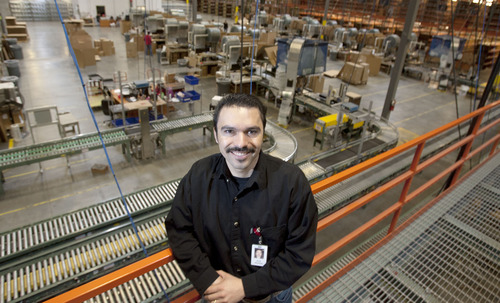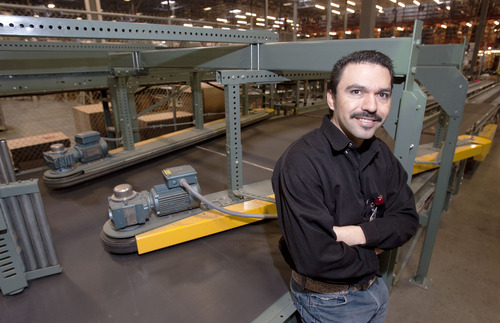This is an archived article that was published on sltrib.com in 2013, and information in the article may be outdated. It is provided only for personal research purposes and may not be reprinted.
José Jimenez came to Utah in 2003 with a green card granting him permanent residence in the U.S., an engineering degree from the Universidad Guadalajara Lamar in Mexico and dreams of a successful career working in the field of information technology.
But unlike many thousands of immigrants who came before him, his hopes weren't frustrated along the way in some dead-end job at a company with no use for his talents and skills.
Jimenez had to prove himself, to be sure, but his desire to work hard and get ahead, along with the willingness of others to listen to him instead of tuning him out, made the difference.
Fast-forward to today, and Jimenez is a respected member of the IT team at one of the Salt Lake Valley's biggest companies.
It could have turned out differently.
Although almost all immigrants dream of building a prosperous life in the United States, many after arriving find themselves working in jobs far below their abilities, and with time their dreams shift to their children, who they hope will find success in the new homeland.
Jimenez remembers the journey from a deeply personal perspective.
Speaking little English upon his arrival, the then-23-year old Jimenez found a job as a janitor, cleaning a warehouse and offices at online discount retailer Overstock.com in Salt Lake City.
"It was a humble and honest job, and I was happy to have it at the time," Jimenez said. "But ever since I was little, I wanted to have a professional career. No one ever took that idea from me. I told myself that I could do better. I told myself that I would do all I could to get a better job."
Jimenez came to this country seeking elements of the American dream: becoming a citizen, buying a home, raising a family and finding a job where he would be judged on his merits and the contributions he made to his employer's business.
The job he took as a janitor set him upon that path, one that blended hard work, sacrifice and success with disappointment and pain.
"When I began work at Overstock I knew the biggest challenge was that I needed to learn English,'' he said. ``I had to be able to communicate. Fortunately, those who I worked with were willing to help me. They corrected me once they knew what I wanted to say, and over the next year I gradually taught myself English, and with their help became more comfortable with the language."
Several months after he started as a janitor, Overstock.com began gearing up for its holiday season and needed help in its shipping department. Jimenez applied for a job as a "packer" and soon found himself putting merchandise into cardboard boxes.
He learned on the job, and one busy season was made a team leader. "My supervisors saw me growing in my job little by little,''Jimenez said, ``and they began to trust my work."
That trust led his supervisors to take seriously a suggestion he made about Overstock's warehouse packing stations. Drawing upon his engineering background, he saw a way to make the packing process more efficient by changing how packing materials were arranged in individual stations.
Jimenez made a prototype of his idea using PVC pipe, and once the company made it operational, the shipping department's productivity increased 30 percent. "Fortunately for us, there was someone around at the time who listened to him," said Steve Tryon, Overstock's senior vice president of human resources.
"José was one of those guys who came here as an immigrant and did everything above board and by the book," Tryon said. "He worked hard and was willing to make sacrifices for the company."
It's a common pattern at Overstock, which has benefited repeatedly from its hiring of immigrants in all areas of the company. "Our experience,'' said Mark Griffin, general counsel at Overstock.com, ``is that they are hard workers with a very good work ethic."
Griffin said Overstock.com has committed "a lot of resources" to helping employees develop skills and knowledge necessary to move up within the organization. "People who come to work here aren't freeze framed in their entry position," he said — and those educational programs are especially popular among immigrant workers.
Tryon also remembers Jimenez volunteering to move to the night shift. "Some people considered the night shift a hardship — it was where all the stress was,'' he said. ``José saw it as an opportunity, and he ended up leading the whole shift."
In 2006, after going through Overstock.com's leadership training program Jimenez became manager for all of the company's packing operations. It was also the year that Jimenez gained U.S. citizenship.
"I remember that José came to me and said that he needed a day off," Tryon said. "I was a little surprised because he was one of those guys who never would ask for time off. But then he told me that he needed that day because he was going to become a U.S. citizen."
Jimenez's story isn't atypical of the immigrant experience, according to immigration advocates.
"Anyone who takes the time to study the immigrant experience will see such success stories replicated thousands of times, over and over," said Josie Valdez, who is vice chair of the Utah Democratic Party.
"Immigrants who come to this country come here for a better life. They want to contribute to our communities and share their aspirations and talents.''
While working his way up in Overstock.com's shipping department, Jimenez nurtured his hopes of working in information technology, attending night school to earn a master's degree in IT. He'd often stay past 11 p.m. to do his homework on the school's computers.
He shared a car and a basement apartment with his brother, a hotel worker in downtown Salt Lake City. "He would drop me off at work and then pick me up when my shift was over and take me to the University of Phoenix for my classes,'' Jimenez recalled.
Overstock's Tryon said that a horrific tragedy brought Jimenez's ambitions to his attention.
In 2007, Overstock employee Vanessa Quinn was among those killed when a gunman went on a shooting rampage at Trolley Square. Quinn, it turned out, was one of José's mentors and upon her death, the company created a scholarship in her name. Jimenez applied for it, successfully.
``It was only then I [found out] he was working on a degree," Tryon said.
After Jimenez got his master's in 2008, he pressed Tryon about going to work in the company's IT department. ``At the time, I told him we really needed him in logistics but that if he would be patient I would see what I could do," Tryon said.
Two years later, Jimenez joined the IT operation, where he now works as a junior quality assurance engineer, testing the software used to run the company's warehouse systems.
"I would like someday to oversee my own team," Jimenez said.
Over the years, Jimenez married his childhood sweetheart, had two children and bought a home.
Tryon said he takes pride in Jimenez's success and he worries that such immigrant success stories get lost in the larger debate on the issue.
Immigration, Tryon said, "has allowed us to draw upon the strengths of all the different cultures of the world."
Said Jimenez: "I believe that immigrants have a lot to contribute to this country. Those who are good people and willing to go through the process set up by the government deserve a chance to show what they can do."
Long path to the American dream
An estimated 13.1 million immigrants with legal permanent resident status were living in the United States as of Jan. 1, 2011, with an estimated 8.5 million eligible to become citizens. There were also 11.5 million unauthorized immigrants within U.S. borders.
Congress and the White House are debating reforming the U.S. immigration system that will impact millions of legal and illegal immigrants.





